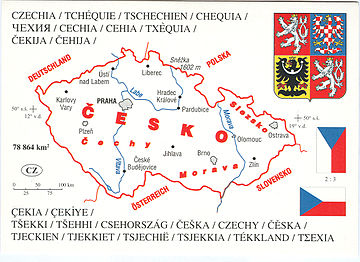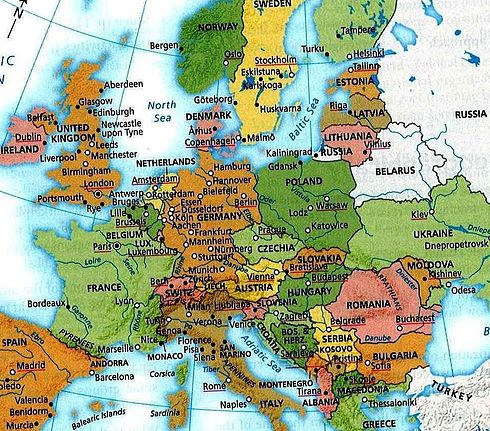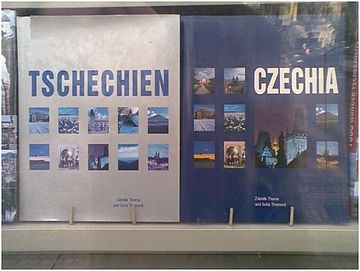- Civic initiative Czechia
-
The "Civic Initiative Czechia" (Občanská iniciativa Česko / Czechia) was formed in Brno in October 1997 as a platform to help spread, insitutionalize and practically adopt Czechia, the geographic one-word name of the Czech Republic,[1] that has been ignored by Czech official institutions, contrary to directions of the Czech foreign ministry in its memorandum (1993).[2] Another reason for the founding of CIC was the fear, that the name Čechy (Bohemia) should be adopted as a synonym of the name Česká republika (Czech Republic), which was an imminent danger at that time.[3] The main arguments of the civic initiative consist in geographical, etymological and linguistic and historical evidence of correctness and necessity of common using the name Czechia as standard equivalent of conventional name of the country.[4]
The founders was professor Rudolf Šrámek, PhD., an established Czech linguist and researcher in the field of onomastics, acting at the Department of Czech Language of Masaryk University, and Karel Kopřiva, at that time deputy mayor of Brno district Židenice. The civic initiative associates not only experts in geography, etymology and linguistics, but also other activists with above mentioned interest. The members organize conferences on this theme, they are authors of many articles in specialized literature and the press,[5] continuously address official institutions of the state and communicate with politicians, international trade, industry and culture officials, schools, media and sports organizations.[6]
In anglophone countries, active supporters of the name Czechia and Czech civic initiative can also be found, who, without support from the Czech authorities themselves on their own initiative, use the name; e.g., Mr. Geoffrey Piper, the chief of The Music Enterprise Agency, based in Luxembourg, an important supporter and promoter of Czech music, wrote in response to the letter of the civic initiave in 2004: "I have used "Czechia" for several years and have recommended it... also in the message to the "British Dvořák Society" - the most important society for Czech music outside Czechia and Slovakia."[7]
Contents
Statements and opinions
Czechia /ˈtʃɛki.ə/ (Česko [ˈtʃɛskɔ] in Czech) is the official English short-form and geographical name of the Czech Republic. The name is registered by the United Nations and included in the UNO Gazetteers of Geographical Names from the beginning of the modern Czech state in 1993.[8]
General problem of the name
The first paragraph above, in similar versions and together with all references, is continuously erased from the main paragraph on the Wikipedia page of the Czech Republic with predominant reasons in half-truth predications, that the name Czechia is not used, because was not naturally established and has not "caught up". That statement is commonly used by opponents of the one-word name of the Czech state and represents typical interchanging of the cause and consequence,[9] arising partially either from personal or unqualified opinions of contributors, partially from the initial unpreparedness of national Czechs at the time of the separation of Czechoslovakia in 1993 and the preponderant indifference to the new state's name.[10] Erroneous interpretations of the problem places aside following facts and premises:
- While the name is not widespread, it is used by official institutions,[11] in works of literature[12] and can be found among more than 2,700,000 links on the internet[13] and is mentioned in 9,160 English books that can be found on books.google.com.[14]
- The reasons for the situation do not arise from unacceptance of the name by English speaking lands.[15]
- The equivalent of the name is used in the overwhelming majority of other languages.
- There is no possibility for people to accept and embody the name in English, that is in disuse by institutions and other parties, that are destined to that purpose from rules of law.
- The political name of a country cannot substitute its geographical name in proper meaning.
The name "Czech Republic", is the administratively-political name of the state, while "Czechia," is the denomination for the geographical and settlement-historical unit, which is independent of actual political regimes and is therefore from this point of view neutral.[16]
Rules of law
In the beginning of the new Czech state in 1993, the appropriate institutions of English speaking lands agreed and conveyed, that they will respect any proposal of the name in English from the Czech side. The decree of the Ministry of Foreign Affairs of the Czech Republic in its memorandum to all Czech embassies and diplomatic missions in 1993, recommended to use the full name "Czech Republic" only in official documents and titles of official institutions. "In all other cases, the one-word name Czechia should be preferred.[17]
Geography
To oversee and determine Czech geographical names, the main regulatory body is the Czech Office for Surveying, Mapping and Cadastre (Český úřad zeměměřický a katastrální).[18] The executive branch is its terminological commission, consisting of the government authorities, state authorities of the Czech Republic, scientific institutions of the Academy of Sciences of the Czech Republic (Czech Language Institute, Institute of History) and Czech universities. The Czech Office for Surveying, Mapping and Cadastre published an English guide entitled Toponymic Guidelines of the Czech Republic, compiled in accordance with Resolutions No.4 of the 4th Conference, No.14 of the 5th conference and No.7 of the 6th Conference of the United Nations on standardization of geographical names. It is intended for foreign editors of maps and other works dealing with Czech toponyms. It is similar in form and content to the toponymic guidelines of other countries.
The geographical name of the Czech Republic "Česko" in Czech and foreign language versions (Czechia in English, Tschechien in German, Tchéquie in French, etc. - see the list of translations of one-word geographical name in "Linguistics" below) has been codified there and also in the publication "The United Nations Geographical Nomenclature Lists - The Names of States and their territorial parts“ (1993).[19]
The name was also accepted by English speaking geographists, which is, for example, documented by the book "European culture area: systematic geography of Europe" by Alexander B. Murphy, Terry G. Jordan-Bychkov and Bella Bychkova Jordan : As for the names of independent countries, we have opted for commonly used anglicized short forms rather than formal country names (e.g., Germany instead of Federal Republic of Germany). The one case that might be less familiar to readers concerns the Czech Republic. Increasingly one hears the short form Czechia. Even though that name is not as widely known as other truncations (e.g., Slovakia for the Slovak Republic), we have decided to use Czechia for consistency and to reflect its growing use in the country itself."[20]
Linguistics
The name Czechia is created naturally, in terms of linguistics. The suffix -ia (originally Latin) is a frequent phenomenon in the English language and the word is derived naturally from the name of the nationality of the majority population of a country. As the name has its origin deep in Czech history in Latin denomination (see below), the choice not to use the English name "Czechia," falls short of any validity, whether linguistic or historical. In addtition, the name has the same suffix as all particular Czech lands, Bohemia, Moravia and Silesia.[21] Czechia has an equivalent in other languages and in the significant majority of them it is obvious, that the natural formation comes from the original Latin form (see the table).
Language Translation Language Translation Language Translation Afrikaans Tsjeggië Frisian Tsjechje Polish Czechy Albanian Çekia German Tschechien Portuguese (T)Chéquia Aragonese Chequia Greek Τσεχία Romanian Cehia Belorussian Чэхія Hungarian Csehország Russian Чехия Breton Tchekia Icelandic Tékkland Ruthenian Чесько Bulgarian Чехия Indonesian Ceko Serbian Чешка Croatian Češka Interlingua Chechia Slovak Česko Danish Tjekkiet Italian Cechia Slovenian Češka Dutch Tsjechië Latin C(z)echia Spanish Chequia Esperanto Ĉeĥio Latvian Čehija Swedish Tjeckien Estonian Tšehhi Lithuanian Čekija Turkish Çekiye Finnish Tšekki Luxembourgish Tschechei Ukrainian Чехія French Tchéquie Norwegian Tsjekkia Yiddish Tshekhay The acceptance of a one-word name for the state in Czech has been riddled in disagreement by Czech citizens and officials since the separation of Czechoslovakia. During the second half of the 1990s¸ most people accepted the name "Česko" because there was no alternative. Now, "Česko" is commonly used by the overwhelming majority of all Czech newspapers, on the internet and TV.[22] Since 2010, "Česká republika" (Czech Republic) has been substituted by "Česko" (Czechia), also on the Czech Wikipedia page.[23] It is worth noting that the Czech National Geographic is called, "National Geographic Česko".
The name Czechia has had a similar destiny as its Czech equivalent had, but more complicated, because its wider application depends on the activity of Czech state institutions and representatives. It can be said, that the long-running problem in the Czech language has been intuitively transported also into the "lingua franca" of today. There has not been any disagreement in English speaking lands concerning the official one-word name for the newly formed country, they accepted Czechia in the beginning without any objection, and the appropriateness of the name was also confirmed by English linguists and other specialists (e.g. Royal Geographical Society, prestigious publishing houses Oxford University Press, Cambridge University Press, etc.).
In 1999, the Association of Communication Agencies (AKA) in cooperation with the New York American Marketing Association and the London Institute of Practitioners in Advertising carried out a survey opinion, asking five hundred native English speakers about the name Czechia. 99% of participants responded: "No problem and do it now".[24]
History
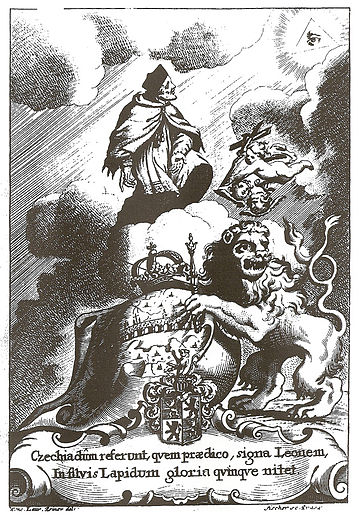 Engraving with inscription, originally from the dissertation of Th.J.Siddener from 1722, reprinted in the book by Vít Vlnas "Jan Nepomucký, Czech legend", frontispiece
Engraving with inscription, originally from the dissertation of Th.J.Siddener from 1722, reprinted in the book by Vít Vlnas "Jan Nepomucký, Czech legend", frontispiece
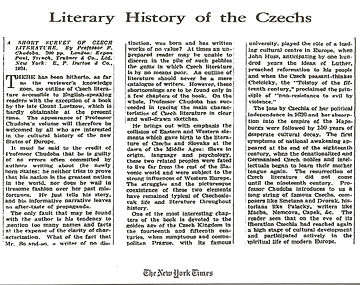 The article "Literary history of the Czechs" in The New York Times from January 4, 1925[25]
The article "Literary history of the Czechs" in The New York Times from January 4, 1925[25]
The name Czechia is not an ad hoc invention. Probably the oldest document of the occurrence of this word is in the work "Respublica Boiema" by Czech writer Pavel Stránský,[26] published in the Dutch town Leiden in 1634.
When visiting St. James´ (Sv.Jakub) church in Prague-Old Town, tangible historical evidence regarding the origin of the name is demonstrated by the inscription on the pulpit: "Pietas Czechia dum posteris posuit" (So, the piety of Czechia brought out its progeny) from the Baroque reconstruction of the church, between 1714 and 1716.
Another example the Latin distich "Czechia dum referunt, qvem praedico, signa Leonem / in silvis Lapidum gloria quinqve nitet" (The glory of Czechia, how I predicated, is shining in the woods by five stones in the sign of the Lion) on the engraving of the frontispiece of the script about Saint John of Nepomuk (Jan Nepomucký), written by Th.J.Siddener in 1722.
A further reference is revealed in is the part no. XXXIII (in Act 3) "Aria. Allegro. En duplo sole Czechia" from the melodrama-oratorial musical composition Sub olea pacis et palma virtutis conspicua orbi regia Bohemiae Corona – Melodrama de Sancto Wenceslao (Under the olive tree of peace and Palm Tree of Virtue the Crown of Bohemia Splendidly Shines the Whole World – melodrama of Saint Wenceslas), written by Czech Baroque composer Jan Dismas Zelenka in 1723.
The oldest evidence of the English substantive word "Czech" in substantive (inhabitant, language) and its adjective derivative (national) comes from 1850. The first historical record of using the word Czechia in English comes from the article "Literary history of the Czechs", published on January 4, 1925 by The New York Times. The name is used there for the Czech state in historical context and is a reference to the Czech lands in its timeless national and geographical continuity (see the press cutting). This fact supports the assertion of Czech specialists to use this name for the Czech state in general, regardless of historical period or momentary political system: "...As Czechia can denominate our country in any historical period and in any social and political conditions...".[27]
In German, the oldest record of the equivalent one-word name, Tschechien, is from 1876, which was published in the book Bilder aus Böhmen, in Italian (Cechia) from 1927 (publication Rivista italiana di Praga) and in French (Tchéquie) from 1936.
Names of the country, its territorial parts & their meanings[28]:
Name Explanation Czech language equivalent Czech Republic Official political name of the contemporary Czech state Česká republika Czechia Official short name of the country Česko Czechoslovakia Country (founded 1918) which, in 1993, split into Czechia and Slovakia Československo Kingdom of Bohemia Historical name of the Czech state until 1918, including historical Czech lands Bohemia, Moravia and Silesia Království české Lands of the Bohemian crown Another historical name, used also for Kingdom of Bohemia (from 1348) Země Koruny české Bohemia Historical name still used to designate the western part of Czechia (sometimes incorrectly used for the whole country) Čechy Moravia Historical name used to designate the eastern part of Czechia Morava Silesia Historical name used to designate the north-eastern part of Czechia Slezsko Sudetenland Historical name used to designate the borderland of Czechia inhabited by ethnic Germans Sudety or pohraniční území Czech 1. inhabitant of Czechia
2. Czech National
3. Czech (adjective)
4. Czech language1. Čech (m), Češka (f)
2. český
3. český
4. češtinaIt is evident that the name Czechia is not a neologism, as has been sometimes claimed, though previously unknown in English.[29] Former initial proposals for the Czech state: "Czechland" or "Czechlands", however linguistically correct, were rejected by experts as less proper from a historical point of view.
Policy
As was shown, the problem of using a one-word name for the Czech Republic does not stem from native English speakers, but rather from Czechs themselves. The unwillingness of Czech institutions to support the widespread use of Czechia in English is evident, contrary to directions of the Czech foreign ministry. In addition, some initiatives of Czech embassies and other official institutions abroad to press on their partners to NOT use the geographical name of the land have been preserved (as one of many examples, the Czech ambassador in London protested when he saw the map of Czechia with the geographical name in the media), being supported by inauspicious personal opinions of some leading Czech politicians. The same pressure was also exerted on some other European countries (France, Italy, Spain, etc.), that partially accepted that requirement, however the reasons for it have never been exactly formulated and (if they were conveyed at all) were predominantly limited to a vague assertion, that Czechs don´t like the one-word name, although in the overwhelming majority, Czech people are not concerned with the name Czechia in other languages.
The statements of politicians from English speaking lands and simultaneously the exact description of the whole problem was most accurately expressed in a letter from the British embassy in Prague (April 4, 2000) signed by Giles Portman, Second Secretary, Press and Politics: "I fully understand your arguments for the use of the name Czechia as a direct, English language equivalent to Cesko. But, Czechs still use the name Ceska Republika rather than Cesko, and the English equivalent, the Czech Republic, rather than Czechia. Were that pattern to change, we would have no problem at all with adapting accordingly. But we feel that the initiative for that change must come from the Czech side and not from us.“.[30]
Social spheres
The name Czechia has not predominated major areas of social activities yet, however its usage is hard to ignore, as seen in organizations involved in international trade and industry, culture, sports, schools, and all kinds of international contacts.
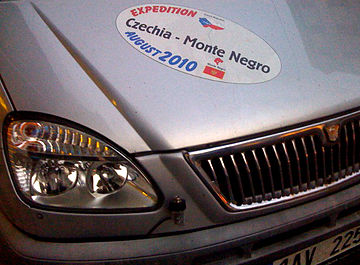 Expedition Czechia - Montenegro 2010
Expedition Czechia - Montenegro 2010
Some Czech opponents of the English one-word name Czechia explain their negative attitude by the assertion, that the name "is not expanded abroad and can not be found on maps" (but for its own expansion, either do nothing or worse, discourage foreign partners from its use, as was mentioned above), however the name is commonly published in official geographical literature,[31] student textbooks,[32] student atlases (see the part of J.Allen′s & C.Sutton′s Student Atlas of World Politics above), tourist guides,[33] tourist road atlases[34] and maps.[35] The largest pictorial encyclopedia of the unique historical, architectural and natural monuments of the Czech Republic bears also the name "Czechia"[36] (see the picture right). Also World Civic Heraldry Guide, an internet heraldic databases of coats of arms and flags, uses of this geographical name of the land.[37]
In the past, some Czech trade companies complained, that the name "Czechia" can be mixed up with names of some other states. The main problem was seen in their confusion by alleged similarity to "Chechnya" (or "Chechenia") and that problem was seriously discussed in Czech media, despite the fact that in the majority of cases the journalists themselves used incorrect spelling "Czechnia" or "Czecnia".[38] What is more, the concerns arose without confirmation by multiple evidence of that problem. That fallacy was repeatedly explained by geographists and linguists,[39] but sometimes it is still mentioned as problematic, which is in sharp contrast to the existence of many Czech trade companies with the name "Czechia" in their trade marks.
As the need of a one-word name for a land is natural and the proper name Czechia has not been widespread, it has been occasionally substituted by "Czech" - a simple abbreviation of the political name "Czech Republic", despite the fact that this is the adjective form and is grammatically incorrect, unparalleled in the English language.[40] This misuse of using "Czech" for the name of the country, has sometimes been upheld as some natural development of the English language, but there is not any substratum for that allegation in English grammar.[41] It is another kind of misinterpretation, because that wrong use arose only from Czech sources (e.g. well known Czech beer Pilsner Urquell with inscription "Pilsen . Czech" on the label; national ice-hockey team jerseys, sport caps, souvenirs, etc.).
All these mistakes have been rejected officially many times by experts,[42] but never fully accepted by appropriate institutions, that largely changed it for some "compromise" (e.g. Czech Olympic Committee, using Czech Team or Czech Ice Hockey Association Czech Ice-Hockey Team), that does not have any parallel in standard official designations worldwide (the standard assignment uses the name of the country, e.g. "Team Canada"). In other cases, they have ignored all arguments and protests.
Grammatical mistake of Czech as the name of the country in comparison with standard English derivation of language forms
Denomination (word type) English / England Portuguese / Portugal French / France Austrian / Austria Czech / Czechia Inhabitant I am English I am Portuguese I am French I am Austrian I am Czech Language I speak English¨ I speak Portuguese I speak French I speak Austrian I speak Czech National It is an English product It is a Portuguese product It is a French product It is an Austrian product It is a Czech product Country I am from England I am from Portugal I am from France I am from Austria I am from Czech ?? - No, I am from Czechia Citations
From the "The opinion of geographers, linguists, historians, and other experts in science and humanities on the problem of the official one-word geographical name for the Czech Republic (from press conferrence at Albertov, Charles University, Prague, January 1998)[43]:
“ Combining the political name of a state with geographical names of other states appears communicatively unsuitable, stylistically clumsy, mannered, and undiplomatic ” The public hearing in the Senate of Czech parliament, May 11, 2004 (Eva Horová, PdD., linguist, 2004):
“ The one-word geographical name, used in Czech (Česko), should be appropriately translated by a one-word geographical one. If it is translated by the political name "the Czech Republic“, it leads to an undesirable shift of the meaning ” "Businessmen versus linguists", Hospodářské noviny (Financial News), September 10, 2004 (Dr.Vladimír Hirsch) :
“ A one-word name of the state represents permanency and timelessness of the statehood, regardless of political structure. Using only the political name represents all we don´t want - transiency, instability and historical discontinuity. ” Official website
References
- ^ Jeleček L.:On the geographic name of the Czech Republic, 2nd Slovak-Czech-Polish Geographical Seminar, Bratislava, September 1–5, 1999, 2nd Slovak-Czech-Polish Geographical Seminar, Bratislava, September 1–5, 1999
- ^ Instructions of the Foreign Ministry of the Czech Republic (26th February 1993, ČSN ISO 3166-1, 1998)
- ^ Jeleček, L., Rubín, J. Čechy jako synonymum pojmů Česká republika, Česko, české země, země Koruny české, aneb ztrácejí se nám Morava a Slezsko. Geografické rozhledy, 7, 1997/8, č. 4, s. 100–102 (in Czech)
- ^ Král V.:Czechia: The problem of one name
- ^ Horová E., Jeleček L., Krejčí P.: "Where are you from?" – "I am from Czechia!" Bulletin of the Czechoslovak Studies Association, Vol. 31, No. 2, Fall 2008. Valdosta State University, Valdosta, GA, pp. 7–10
- ^ Open letter to the Czech Olympic Foundation, Czech Sports Union, politicians, business people, media, etc.", National Geographic, 2001
- ^ Horová E.: Record of Proceedings of the 7th Public Hearing of the Senate, May 11, 2004 (Czech)
- ^ United Nations: The names of states and their territorial parts
- ^ Jeleček L.: Czechia. In: Encyclopedia of World Environmental History. Eds. S. Krech III, J. R. McNeill, C. Merchant, Vol. I. A–F, A Berkshire Reference Works, Routledge, New York &, London, pp. 279–280
- ^ Krejčí P.: Item 1 - Czech independence, "Don't be afraid of Czechia, it needs your help!"
- ^ European Union / Euweb
- ^ Martson S. et al.: World Regions in Global Context: Peoples, Places, and Environments, 4th edition. Prentice Hall, Boston, 411 p. (2011)
- ^ Hirsch V.: Czechia - the civic inititive
- ^ Czechia in Google Books
- ^ Krejčí P.: Don't be afraid of Czechia, it needs your help! (2008)
- ^ Lutterer I., Šrámek R.: Preface to the book "Zeměpisná jména v Čechách, na Moravě a ve Slezsku. Slovník vybraných zeměpisných jmen s výkladem jejich původu a historického vývoje (Geographical names in Bohemia, Moravia and Silesia. The dictionary of selected geographical names with the interpretation of their origin and historical development"), 2004, p.3-4
- ^ Instructions of the Foreign Ministry of the Czech Republic (26th February 1993, ČSN ISO 3166-1, 1998)
- ^ Czech Office for Surveying, Mapping and Cadastre - basic info (in Czech)
- ^ Information No.489/2003 Sb. (collection of laws) of the Czech Office for Surveying, Mapping and Cadastre about the releasing of The List of States. Ratified December 18, 2003. Legal with efficiency since January 1, 2004 (4-21). Published in the „Collection of Laws“ of the Czech Republic, No.160/2003, p.8422
- ^ Murphy, A. B, Jordan-Bychkov, T. G., Bychkova-Jordan Bella: The European culture area: a systematic geography. 5th ed., Rowman & Littlefield, Lanham, MD, s. XV.
- ^ Horová E.: "Where are your from ? I am from Czechia", original version
- ^ Czech Republic Country Guide
- ^ Czech Wikipedia: Česko
- ^ Protocol about public hearing of the Senate of the Czech Republic on the theme "Literary distinction of Czech Republic and Czechia", p.42, 1999
- ^ Literary history of the Czechs, The New York Times, January 4, 1925
- ^ Pavel Stránský Czech Wikipedia
- ^ Lutterer I., Šrámek R.: Preface to the book "Geographic names in Bohemia, Moravia and Silesia. The dictionary of selected geographical names....."), 2004, p.3-4
- ^ Czech dialogue ("Magazine for Czechs at home and abroad"): Czechia ? Yes ! (2007)
- ^ How is Česko in English - the answer has been existed for more than 16 years, Czech dialogue, 2009
- ^ Horová E.: Record of Proceedings of the 7th Public Hearing of the Senate, May 11, 2004 (Czech)
- ^ Martson, S. et al.: World Regions (3)
- ^ Allen, J., Sutton, C.: A Student Atlas of World Politics, 9th Edition. McGraw-Hill Higher Education, 240 p.
- ^ Nations online: One World: Czech Republic
- ^ Road atlas "Česko - Czechia - Tschechien"
- ^ Road map "Česko - Tschechien - Czechia" (Freytag & Berndt)
- ^ Thomová S., Thoma Z.: Czechia - picture encyclopedia
- ^ World Civic Heraldry Guide: Coats of arms and flags of cities, regions, states
- ^ The infinite dispute Czech Republic vs. Czechia - Radio.cz (in Czech)
- ^ Krejčí P.: The Chechnya Fallacy
- ^ Marianna O.: Czechia - The Czech Republic
- ^ Dictionary.com - Czech
- ^ Bičík R., Perlín R.: Press statement on the importance of the correct use of this country’s name in foreign languages (2001)
- ^ The statement of geographers, linguists, historians, and other experts on the problem of the official one-word geographical name for the Czech Republic(1998)
Other sources
- Jeleček, L.: Codification of the names Česko / Czechia from 1993, NP, 2001
- Codebook of states in the Collection of Laws of the Czech Republic, no.160/2003
- Velíšek Z.: What’s in a Name? Identity Politics in "Czechia"
- Čižmárová, L., Felix, J., Horová, E., Jeleček, L., Krejčí, P., Schnur, P.: To the question of verbal and visual presentation of the Czech state (K otázce verbální a vizuální prezentace českého státu). In: Czech Hospitality and Tourism Papers: č. 5, s. 86–97. ISSN 1801-1535, 2007
- Krejčí, P.: 15 years of independent Czech state; Masaryk University, Brno, 2008
- Čižmárová, L.: About peripeteias of the development of the name of our state and attitudes to them since 1918 (K peripetiím vývoje názvů našeho státu a postojů k nim od roku 1918). Naše řeč, 82, č. 1, s. 1-15., 1999 (in Czech)
- Felix J.: The name Česko is pervading into common vocabulary (Yearbook 2002, Technical University in Liberec, p. 155-161, (in Czech)
- Hirsch V.: The name is a fate (Jméno je osud), 2011 (in Czech)
- Jeleček, L.: On the geographic name of the Czech Republic. Geographica Supplementum No 2/I, Bratislava 1999, pp. 279–285.
- Krejčí, P.: Česko has had its official English translation for 16 years. Vesmír, 88, March 2009, p. 200–202.
- The Economist What's in its name?
See also
External links
Categories:- Geography of the Czech Republic
- Geographical naming disputes
- Names of places in Europe
- Country name etymology
- Czech Republic
Wikimedia Foundation. 2010.

